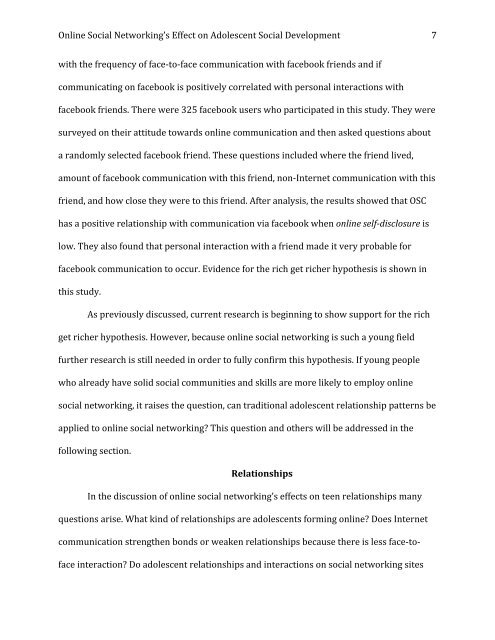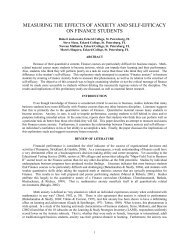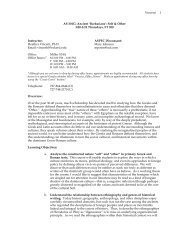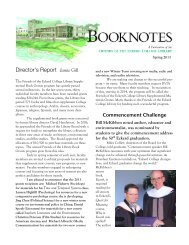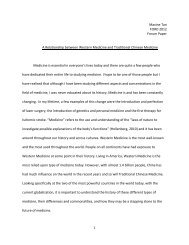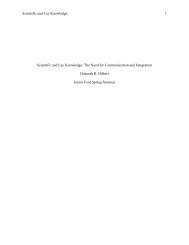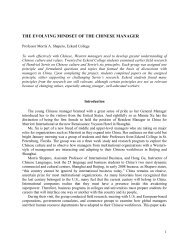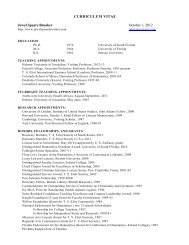Online Social Networking's Effect on Adolescent ... - Eckerd College
Online Social Networking's Effect on Adolescent ... - Eckerd College
Online Social Networking's Effect on Adolescent ... - Eckerd College
You also want an ePaper? Increase the reach of your titles
YUMPU automatically turns print PDFs into web optimized ePapers that Google loves.
<str<strong>on</strong>g>Online</str<strong>on</strong>g> <str<strong>on</strong>g>Social</str<strong>on</strong>g> Networking’s <str<strong>on</strong>g>Effect</str<strong>on</strong>g> <strong>on</strong> <strong>Adolescent</strong> <str<strong>on</strong>g>Social</str<strong>on</strong>g> Development<br />
with the frequency of face‐to‐face communicati<strong>on</strong> with facebook friends and if<br />
communicating <strong>on</strong> facebook is positively correlated with pers<strong>on</strong>al interacti<strong>on</strong>s with<br />
facebook friends. There were 325 facebook users who participated in this study. They were<br />
surveyed <strong>on</strong> their attitude towards <strong>on</strong>line communicati<strong>on</strong> and then asked questi<strong>on</strong>s about<br />
a randomly selected facebook friend. These questi<strong>on</strong>s included where the friend lived,<br />
amount of facebook communicati<strong>on</strong> with this friend, n<strong>on</strong>‐Internet communicati<strong>on</strong> with this<br />
friend, and how close they were to this friend. After analysis, the results showed that OSC<br />
has a positive relati<strong>on</strong>ship with communicati<strong>on</strong> via facebook when <strong>on</strong>line selfdisclosure is<br />
low. They also found that pers<strong>on</strong>al interacti<strong>on</strong> with a friend made it very probable for<br />
facebook communicati<strong>on</strong> to occur. Evidence for the rich get richer hypothesis is shown in<br />
this study.<br />
As previously discussed, current research is beginning to show support for the rich<br />
get richer hypothesis. However, because <strong>on</strong>line social networking is such a young field<br />
further research is still needed in order to fully c<strong>on</strong>firm this hypothesis. If young people<br />
who already have solid social communities and skills are more likely to employ <strong>on</strong>line<br />
social networking, it raises the questi<strong>on</strong>, can traditi<strong>on</strong>al adolescent relati<strong>on</strong>ship patterns be<br />
applied to <strong>on</strong>line social networking? This questi<strong>on</strong> and others will be addressed in the<br />
following secti<strong>on</strong>.<br />
Relati<strong>on</strong>ships<br />
In the discussi<strong>on</strong> of <strong>on</strong>line social networking’s effects <strong>on</strong> teen relati<strong>on</strong>ships many<br />
questi<strong>on</strong>s arise. What kind of relati<strong>on</strong>ships are adolescents forming <strong>on</strong>line? Does Internet<br />
communicati<strong>on</strong> strengthen b<strong>on</strong>ds or weaken relati<strong>on</strong>ships because there is less face‐to‐<br />
face interacti<strong>on</strong>? Do adolescent relati<strong>on</strong>ships and interacti<strong>on</strong>s <strong>on</strong> social networking sites<br />
7


